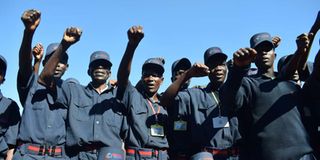State owes private security firms Sh3bn

Chakra private security guards sing solidarity songs in Kisumu on October 3, 2019. File | Nation Media Group
What you need to know:
- The firms, which largely depend on government for business, complained that the payments had been delayed for more than six months.
- The Nairobi County government owes Sh122 million for services rendered over five months.
Private security firms have warned of imminent collapse following delayed payments for services rendered to key government ministries, agencies and parastatals.
Through the umbrella Protective Security Industry Association (PSIA), the firms yesterday claimed they are owed Sh3 billion for services offered before and during the Covid-19 period.
The firms, which largely depend on government for business, complained that the payments had been delayed for more than six months.
Top on the list of debtors is the Ministry of Sports, which PSIA said has an outstanding bill of Sh25 million, accrued over nine months, for security services provided to all the stadia in Nairobi.
The Judiciary owes Sh87 million for four months’ security in various courts, while the Health ministry is yet to pay Sh137 million for services rendered to various agencies. The Nairobi County government owes Sh122 million for services rendered over five months.
Fast-track payments
Other state debtors are Treasury (Sh4 million), Kenya Broadcasting Corporation (Sh1.3 million), Water Resources Authority (Sh2 million), National Museums of Kenya (Sh4 million), Uchumi Supermarkets (Sh42 million), Kenya Railways Corporation (Sh30 million), Migori County (Sh18 million) and Busia County (Sh13 million). The money is owed to multiple security companies.
PSIA chairman Cosmas Mutava called on the government to fast-track payments to cushion Kenya’s 700,000 private security guards’ livelihoods.
“Security provision is the prerogative of the government. What we offer are complementary services. If we don’t get paid, then we run the risk of laying off our staff during these tough times and eventually closing shop. The impact of that to the industry would be regrettable,” warned Mr Mutava.
The association noted that the economic strain resulting from the Covid-19 pandemic has seen more than 20,000 guards sacked between the months of March and August this year due to the closure of hotels, schools and universities.
“We have seen clients who were employing about 40 guards reducing the numbers to eight, to only cover key sections of institutions that cannot be left unmanned. These are entry points and, say, finance offices. The clients did this to manage their wage bill,” said the chairman.
Security services
The PSIA members complained some clients had resorted to strange ways of fighting the spread of Covid-19. In one agency under the Health ministry, for instance, two guards tested positive and the management demanded an overhaul of the entire team.
The association noted that though security services are gazetted as essential services, the firms have not enjoyed much support from the government.
They called on the government to zero-rate the cost of personal protective equipment and thermal guns, and introduce free Covid-19 testing to cushion more firms from collapse.
“We are now required to pay for the guards’ tests and train them on how to use the thermal guns before assigning them duties,” said the association.





